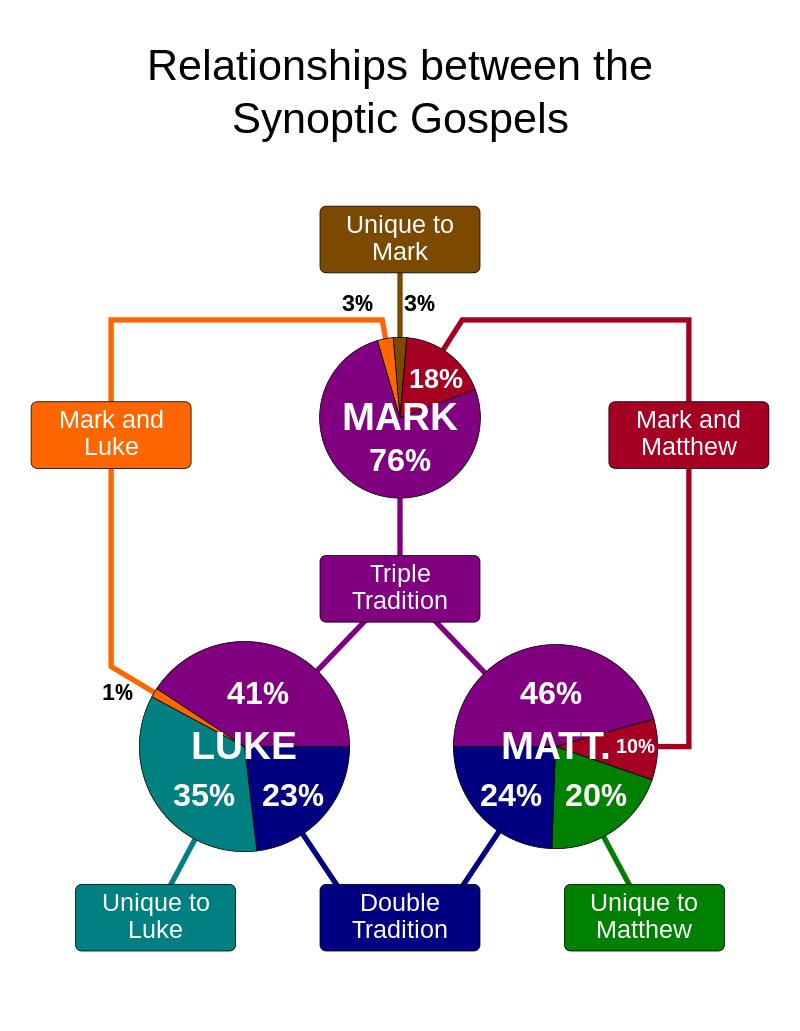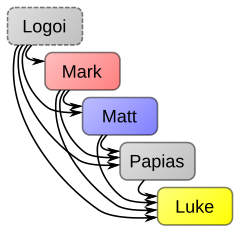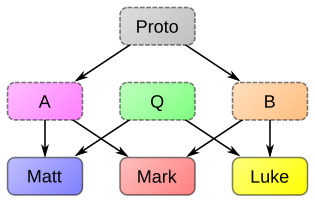

Posted on 03/31/2018 5:13:46 PM PDT by SeekAndFind
If we’re not careful, we can begin to think of the Bible as one book. But it’s not one book; it’s a collection of books—sometimes referred to as the biblical canon. Of course, this correct understanding of the canon raises an important question: why these books and not others?
For instance, the New Testament includes four Gospels about the life of Jesus: Matthew, Mark, Luke, and John. These are called canonical Gospels because they are in the canon. But these weren’t the only Gospels about Jesus in the ancient world. In fact, we have discovered many other Gospels, like the Gospel of Thomas, the Gospel of Mary, the Gospel of Philip, and so on.
Given the plethora of Gospels out there, why does the New Testament only include Matthew, Mark, Luke, and John? What is so special about these four Gospels?
I want to give four reasons why the four Gospels stand out as unique among all other Gospels in early Christianity. Simply put, the four Gospels are the REAL Gospels of Jesus’ life because they were recognized widely in the early Church, they are the earliest Gospels we possess, they are apostolic, and they lack obvious embellishment.
First, they were recognized. Many people have a faulty understanding of how the New Testament canon was originally assembled. They mistakenly believe that individuals with authority used their authority to pick which books to include and exclude. On this view, the early church created the canon based on subjective feelings. In reality, it was the books with authority in themselves that just were the standard, or canon. On this view, the early church recognized the canon based on objective facts. This distinction is fundamental to properly understanding the formation of the canon.
Therefore, the church did not give authority to the books. Rather, it merely recognized the authority of the books. And the historical evidence backs this up. It can be demonstrated that the early church was using these four Gospels and ignoring—and even condemning—all the others. In fact, we don’t have a single canonical list from the ancient world that says, for example, Matthew, Mark, Luke, and Thomas, or Matthew, Luke, John, and Peter. It’s always the four canonical Gospels without exception.
An evidence for the early recognition of the four canonical Gospels is the Muratorian fragment (also known as the Muratorian canon). Dating back to the late second century (AD 180), the Muratorian fragment lists 22 of the 27 books in the New Testament, including the four Gospels. This shows that the core canon was already present very early in the history of the church. Was there still disagreement about a handful of New Testament books? Yes. But, the church was absolutely unified on the four Gospels.
Second, they are early. Matthew, Mark, Luke, and John are all from the first century. Consequently, they are the earliest Gospels we have. All of the other Gospels date to the second century or later. The four Gospels take us closer to the events of Jesus’ life than any other Gospel. In fact, they were written when eyewitnesses to the events they recorded were still alive. This provides evidence of the reliability of the four Gospels.
Third, they are apostolic. That is, they were written by an apostle (as in the case of Mathew and John) or by a close companion of an apostle (as in the case of Mark and Luke). If we want a reliable Gospel, we want it to be written by an eyewitness or someone very close to an eyewitness. No one would have known Jesus’ life and ministry better than the apostles.
Furthermore, the apostles weren’t merely companions of Jesus; they were commissioned by Jesus.
And Jesus came and said to them, “All authority in heaven and on earth has been given to Me. Go therefore and make disciples of all nations, baptizing them in the name of the Father and of the Son and of the Holy Spirit, teaching them to observe all that I have commanded you. And behold, I am with you always, to the end of the age.” (Matt. 28:18–20)
And He appointed twelve (whom He also named apostles) so that they might be with Him and He might send them out to preach and have authority to cast out demons. (Mark 3:14–15)
But the Helper, the Holy Spirit, whom the Father will send in my name, He will teach you all things and bring to your remembrance all that I have said to you. (John 14:26)
This is the backdrop for understanding why the church is “built on the foundation of the apostles and prophets” (Eph. 2:20).
Therefore, if a Gospel is to be authoritative, then it must be closely related to an apostle. For example, Luke was not an apostle, but he was a protégé of the apostle Paul. So it is not surprising that Paul refers to Luke’s Gospel as Scripture (1 Tim 5:18; cf. Luke 10:7). By the way, this is why many later Gospels are falsely attributed to apostles (e.g. the Gospel of Thomas and the Gospel of Peter). Observing the influence apostolic writings had on the early church, forgers used names of apostles to try to gain acceptance.
Finally, they lack embellishment. The later, non-canonical Gospels include legendary and embellished stories, whereas the four canonical Gospels read like real history. Writing at his blog, Canon Fodder, New Testament scholar Michael Kruger writes,
Many of these apocryphal writings contain obvious embellishments and legendary additions. For example, in the Gospel of Peter, Jesus emerges from the tomb as a giant whose head reaches the clouds, and he is followed by the cross itself which then speaks.
Contrast this account with the resurrection narratives in the four Gospels. It is interesting that none of the Gospels actually give a description of the resurrection happening. We read about the crucifixion and burial, but we don’t get an account of the resurrection as it’s taking place. When the women show up Sunday morning, the tomb is already empty and the resurrection has already happened. The Gospel of Peter—written in the second century—tries to fill in the gap with an obvious later embellishment.
Can you see why the four canonical Gospels are included in the canon while other Gospels are excluded? There is something special about these books. Always remember why the four Gospels are the REAL Gospels. They are recognized, early, apostolic, and lack obvious embellishments.
The Holy Spirit only authored the four gospels.
Bookmark
Thanks for a very interesting and timely post. I personally feel that many along the course of early Christianity were inspired to write - by the spirit and their faith, and all brought their unique perspective to what they wrote. Although I agree with you about the four Gospels, I would love to read translations of all that was written.
Personally, I feel that God speaks to us each and every day, if we listen. I am too often preoccupied with things that won’t matter ultimately, or I would hear, see, and feel what God ‘speaks’ much more than I do.


I believe to him (Luke) and him alone can we be grateful for an account of Mary's visit ti Elizabeth and the beautiful Magnificat along with all the marvelous details.
Which are the two that there has been some speculation that one was at least in part copied from another one?
Because they either didn’t glorify God or Yeshua; wasn’t preaching the word Yeshua risen.
Good work by Tim Barnett. Thanks for posting.
>>Personally, I feel that God speaks to us each and every day, if we listen.
He speaks as a Father, but does not give out Special Revelation anymore. We are in an age where the Special Revelation found in the bible is still being played out.

Farrer (Mark-Matthew)
Three‑source (Mark‑Q/Matthew) 
Q+/Papias Hypothesis (Mark‑Q/Matthew) 
Wilke (Mark-Luke)
Two‑gospel (Griesbach) (Matthew‑Luke) 
Augustinian (Matthew‑Mark)
Jerusalem school (Luke‑Q) 
Proto‑gospel 
Independence 
I’m certainly no Biblical scholar but I do know that the four Gospels tell the story of the life of Jesus, whereas the Gospel of Thomas, which was discovered in 1945 as part of the Nag Hammadi library, is more of a collection of sayings by Jesus. That would seem like a nice addition through today’s lens, but at the time I can see that those who compiled the Bible would be more interested in the narrative.
Where is the Gospel of John?
It’s not one of the synoptic Gospels
If there is a Q, I assume it is the scribes who were often present and following Jesus with Pharisees. Perhaps Joseph of Arimathea or Nicodemus had access and made them available and their writings preserved much of Jesus’s words. Turning something meant for evil to good is something God would do.
Glad you cleared that up with charts..
My understanding is other accounts are forgeries with gnostic sympathies. Furthermore, what we have included in actual canon is the inspired word of God, and God has provided us with it as a complete reveation for his will for salvation. So, what’s the point in even bothering with the other stuff outside of being sure someone isn’t mislead?
John 21:24-25
This is the disciple which testifieth of these things, and wrote these things: and we know that his testimony is true.
25 And there are also many other things which Jesus did, the which, if they should be written every one, I suppose that even the world itself could not contain the books that should be written. Amen.
I always tell the profs that they're full of it because the scriptures clearly point out in 2 Peter 1:20 & 21,
"Knowing this first, that no prophecy of the scripture is of any private interpretation. For the prophecy came not in old time by the will of man: but holy men of God spake as they were moved by the Holy Ghost."
How about we just say that the Holy Spirit spake through holy men of old and gave us the Gospels? It’s more accurate and much simpler.
Disclaimer: Opinions posted on Free Republic are those of the individual posters and do not necessarily represent the opinion of Free Republic or its management. All materials posted herein are protected by copyright law and the exemption for fair use of copyrighted works.